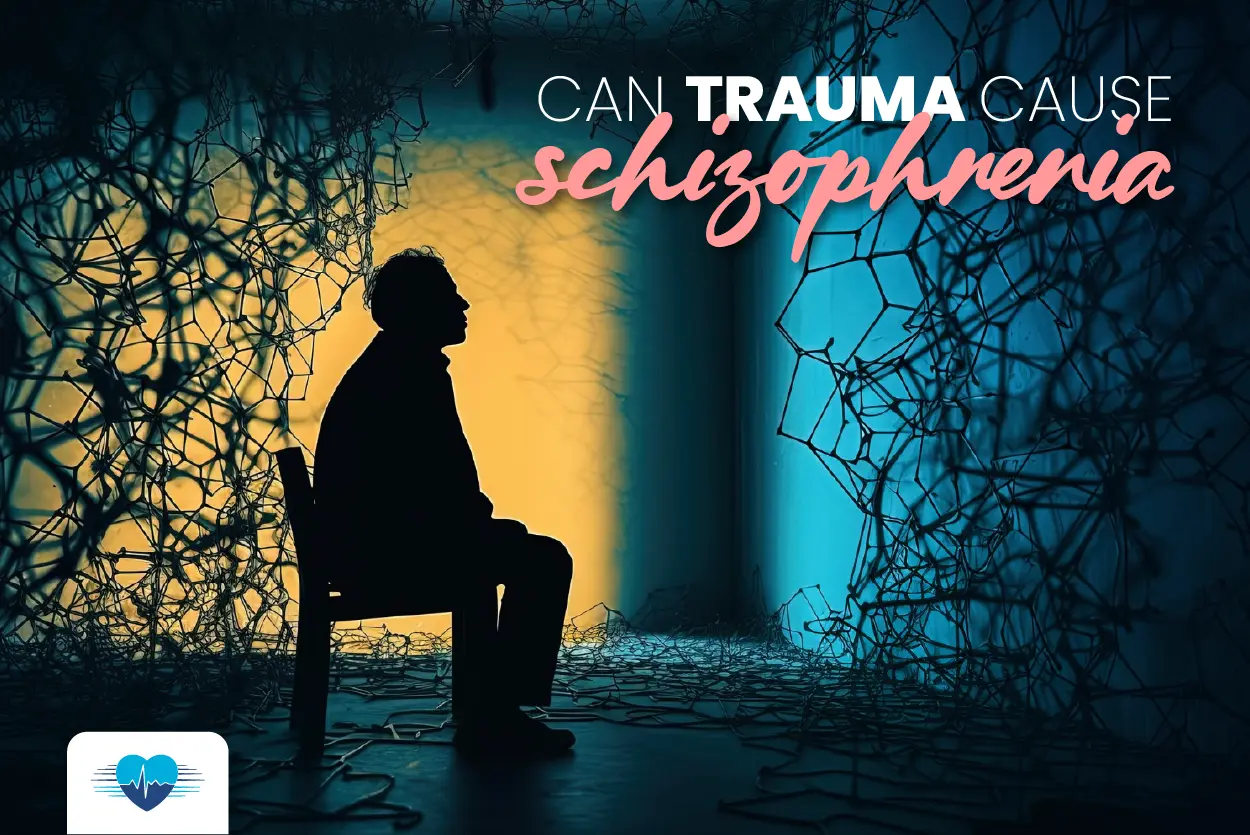Do you think trauma cause schizophrenia?
Trauma and schizophrenia are both very complicated conditions that have interested scientists and doctors for many years. There is growing evidence that traumatic events can lead to schizophrenia spectrum disorders, even though they are different.
Today Telemedicine is a well-known telemedicine company that caters to the needs of people suffering from mental illnesses.
We make it easy to communicate with mental health professionals online, and they can assist you with a variety of mental health issues.For more information contact us.
Let us look into this complicated connection: can trauma cause schizophrenia by looking at the research, theories, and what they mean for understanding and treating these conditions?
What is Schizophrenia?
Schizophrenia is a long-term brain disorder that affects a very small percentage of Americans.
People with schizophrenia may have delusions, hallucinations, slurred speech, trouble thinking, and a lack of motivation. But with treatment, most of the symptoms of schizophrenia will get a lot better, and it may be less likely that the illness will come back.
Even though there is not a cure for schizophrenia, research is finding new ways to treat it that are safer.
Researchers are also trying to figure out what causes the disease by looking at genetics, behavior, and the structure and function of the brain using advanced imaging techniques. These approaches made it possible for new therapies to be found that work better.
Let’s talk about what is trauma?
What is Trauma?
When someone goes through a traumatic event, like an accident, rape, or natural disaster, they feel bad. It is normal to feel shocked and denial right after something happens.
Long-lasting effects include mood swings, flashbacks, tense relationships, and even physical signs like nausea or headaches.
It is normal to feel this way, but some people find it hard to move on with their lives. Psychologists can help them deal with their feelings in a healthy way.
At Today Telemedicine, we can help you.
Can Trauma Cause Schizophrenia
There is a strong link between trauma and schizophrenia, according to research.
Can childhood trauma cause schizophrenia?
People who are genetically more likely to develop psychosis or schizophrenia may be more likely to have traumatic events in their childhood, especially if they were very bad.
Trauma, especially when it happens as a child, can change the body in ways that can make it more likely to develop mental illnesses like schizophrenia.
Trauma may play a part in schizophrenia, but it is not the only cause of it. Trauma and schizophrenia are linked in a complicated way that includes genetic, neurobiological, and environmental factors.
If you or someone you know has schizophrenia or trauma, see a mental health professional for a thorough assessment and support.
Can PTSD Cause Schizophrenia
Post-traumatic stress disorder (PTSD) and schizophrenia can show up in the same way.
People with PTSD may mistake intense flashbacks for hallucinations. PTSD can make people very alert all the time, which can manifest as acting suspiciously.
What makes PTSD different from the other two is that people with PTSD have flashbacks to a traumatic event and are always very aware.
The traumatic event did not cause them, and for people with schizophrenia, they do not mean what they say.
It is possible to have both PTSD and schizophrenia at the same time.
More research is being done to find out how common this comorbidity is.
An investigation of people with schizophrenia found that 44.3% of them had experienced PTSD at some point in their lives. Another study looked at a group of people with schizophrenia who got their care from a community mental health center. It found that 91% of them had been through a traumatic event.
These results show that more research needs to be done on how traumatic events affect the number of people who get mental illnesses like schizophrenia.
In a study of patients with schizophrenia, 44.3% had experienced PTSD at some point in their lives.
A different study looked at people who got help from a community mental health center. 91 percent of them had been through something traumatic.
How traumatic events affect the number of people who get schizophrenia needs more research.
Mental health problems, like schizophrenia and other psychotic disorders, get worse when you are stressed.
If you have schizophrenia and then go through a traumatic event, your symptoms are likely to get worse and you may even be diagnosed with PTSD.
Let’s talk about the symptoms of schizophrenia.
What is Presented Symptoms of Schizophrenia?
Schizophrenia symptoms can be very different from person to person, but they usually fall into these groups:
- Positive Symptoms:
Some of these are changes in how someone thinks, acts, and sees the world. People who have positive symptoms may lose touch with reality and have hallucinations (seeing, hearing, smelling, tasting, or feeling things that do not exist outside their mind) and delusions (false beliefs that they cannot change even when given facts).
- Negative Symptoms:
Some people with these problems shut out the world around them, do not care about normal social interactions, and often seem emotionless and flat. Some bad signs do not want to do fun things, not caring for oneself and their needs, and losing interest in life and things to do.
- Cognitive Symptoms:
These can include thinking and speaking that are not organized, having trouble focusing, and having memory and attention issues.
Now let’s talk about the prevention of schizophrenia.
What are the protective factors that can reduce the risk of Schizophrenia?
There are things that can help lower the risk of developing schizophrenia. The following are some protective factors that can help lower the risk of getting schizophrenia:
- Social Support:
A strong support system, like family, friends, or a community, can help people deal with stress and trauma, which may play a role in the development of schizophrenia.
- Mental Health Interventions:
Therapy or counseling are examples of mental health interventions that can help people deal with stress and trauma and improve their overall health.
- Avoiding Substance Use:
Mental illnesses like schizophrenia and psychosis are more likely to happen if you use drugs, especially cannabis, cocaine, LSD, or amphetamines. Reducing the risk of developing schizophrenia can be achieved by avoiding substance use.
- Regular Physical Activity:
Physical activity on a regular basis can help improve your health and well-being, which may lower your risk of developing schizophrenia.
- Nutritious Diet:
Following a healthy diet can improve your overall health and well-being, which may lower your chances of developing schizophrenia.
- Healthy Sleep Practices:
Improving your overall health and learning healthy ways to sleep can help people deal with stress, which may help lower the risk of developing schizophrenia.
- Dietary Supplements:
Omega-3 fatty acids are one type of dietary supplement that may help keep psychotic disorders from getting worse and may even help stop schizophrenia from happening.
- Family Education and Support:
Family members who know about schizophrenia and are there for their loved ones can help people with schizophrenia deal with their symptoms and improve their overall health.
- Drug or alcohol Treatment:
If you need to, getting help for a drug or alcohol addiction can lower your risk of getting schizophrenia.
- Smoking Cessation:
As smoking can make schizophrenia more likely to happen, giving up smoking can help lower your risk of getting it.
- Art Therapy:
You can deal with stress better and feel better overall by doing art therapy, which may help lower the risk of developing schizophrenia.
In conclusion, can trauma cause schizophrenia?
It is possible that trauma can lead to schizophrenia, but it is not the only cause.
Genetic, neurobiological, and environmental factors are thought to interact in a complex way to cause schizophrenia.
Getting help early, keeping a strong support system, and living a healthy lifestyle can all help lower the risks of developing schizophrenia.
Remember that dealing with and understanding mental health issues like schizophrenia and trauma is very important for your overall health and quality of life.
FAQs
How would you prevent schizophrenia?
The complicated nature of schizophrenia, which is affected by genetic, environmental, and neurobiological factors, means that it is not currently possible to completely prevent it.
But living a healthy life, staying away from drugs, getting help for mental health problems early, and keeping a strong support system can help manage the risk factors that are linked to schizophrenia.
What are the three main causes of schizophrenia?
Psychosis is thought to be caused by a mix of genetic, environmental, and neurobiological factors.
Genetic predisposition (family history), early exposure to certain environmental stressors or trauma, and imbalances in brain chemistry and structure are the three main reasons given.
How do you overcome schizophrenia?
People with schizophrenia usually need a full treatment plan that is made just for them in order to get better.
This could include a mix of antipsychotic drugs, therapy, social support, job retraining, and changes to the person’s lifestyle.
The best ways to control symptoms and raise quality of life are to start treatment early and keep it up.
What is the biggest symptom of schizophrenia?
Some of the most common symptoms of schizophrenia are hallucinations, delusions, disorganized thinking, behavior, and social dysfunction.
These symptoms often get in the way of daily life and can be upsetting for both the person who has them and their loved ones.





No comment